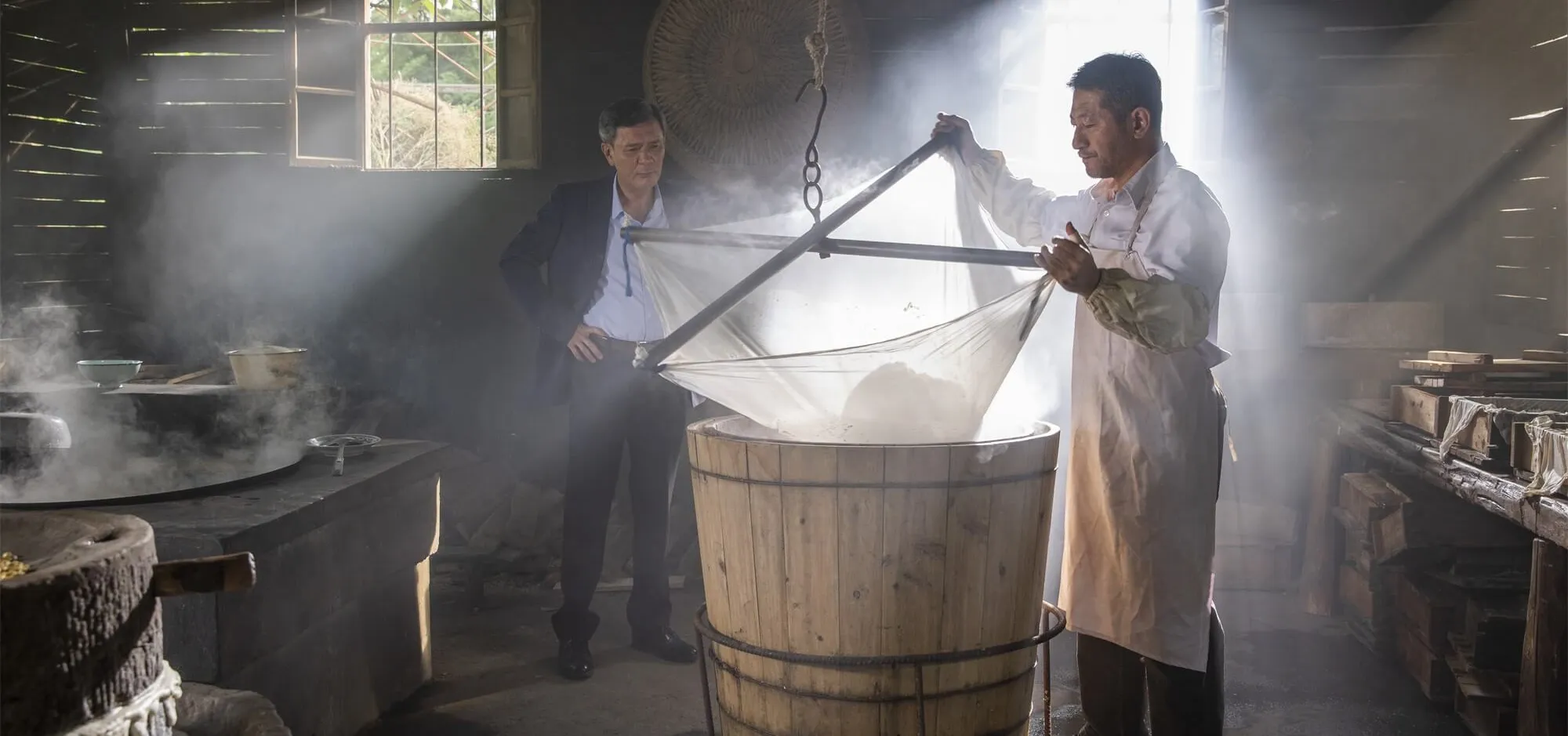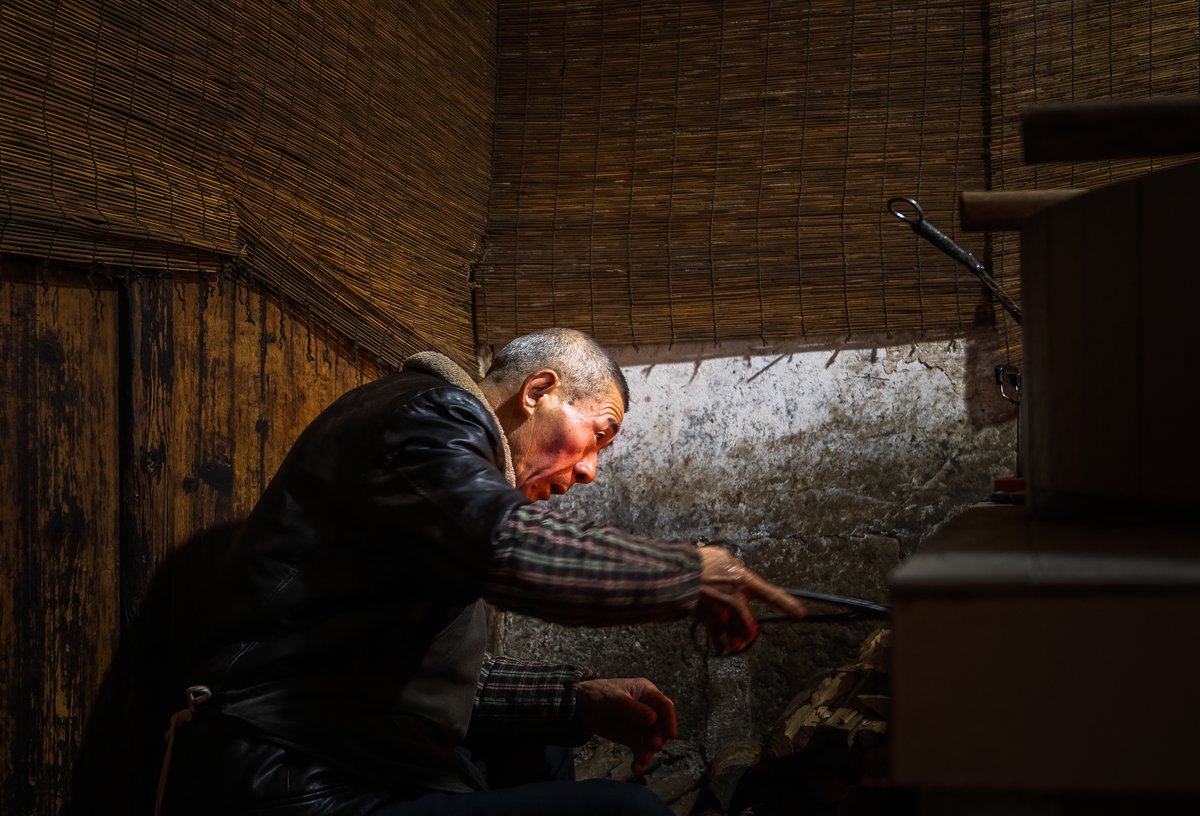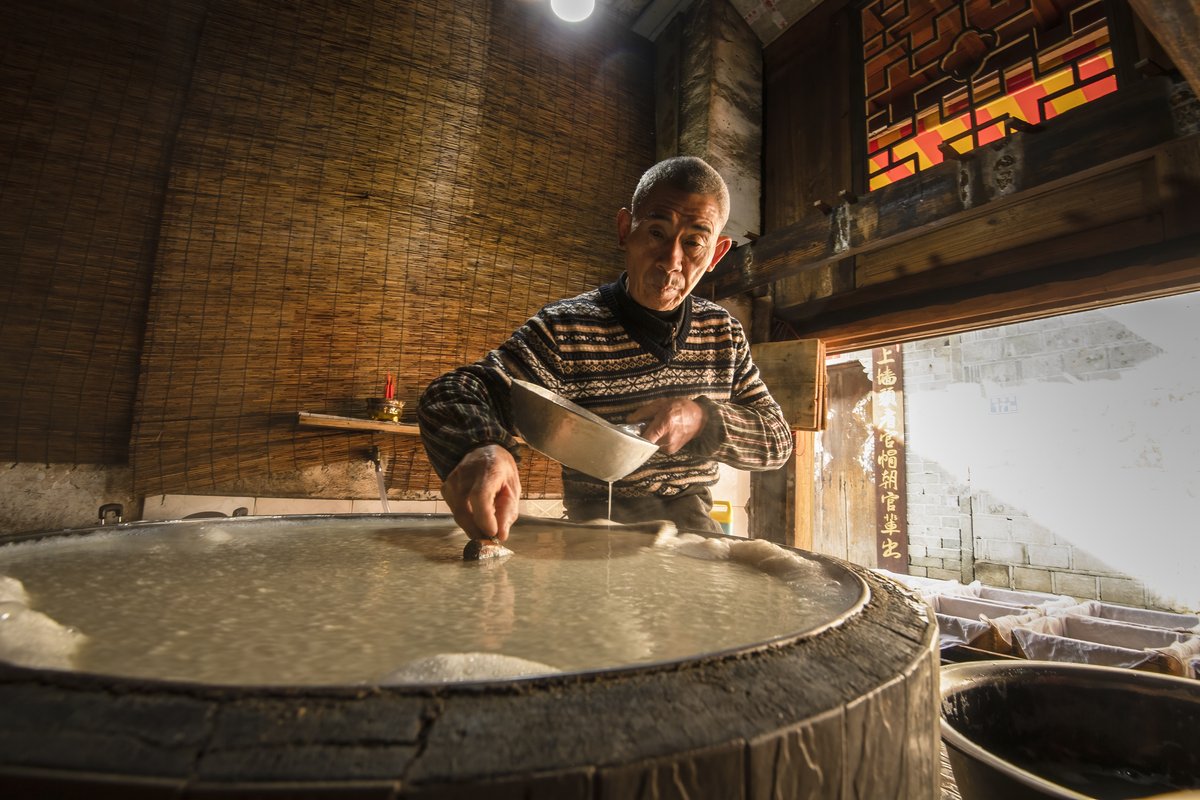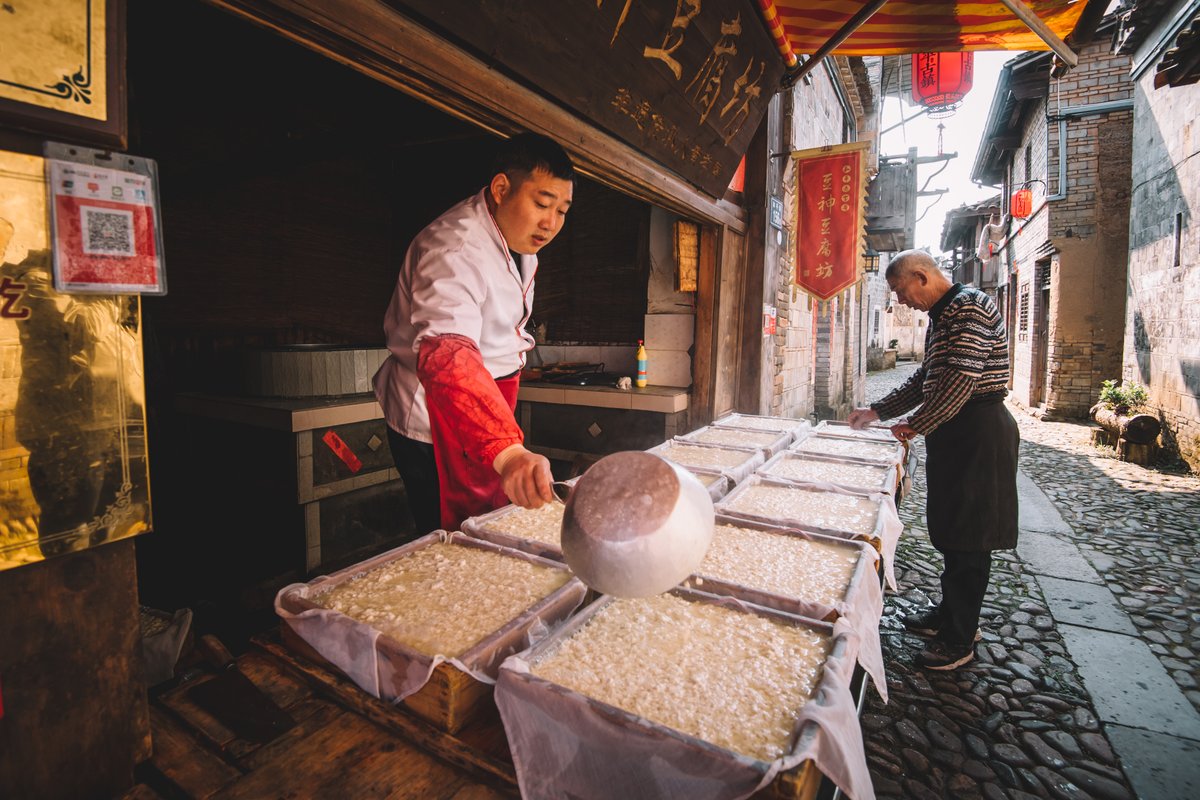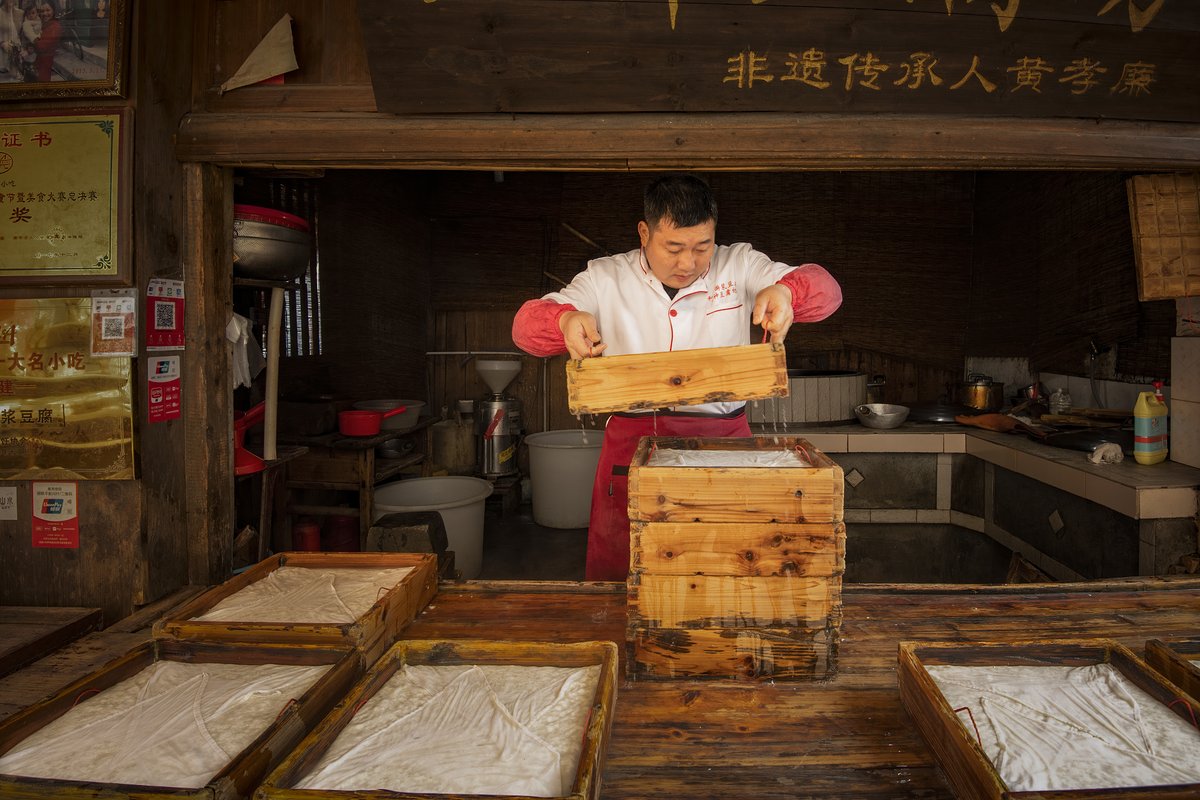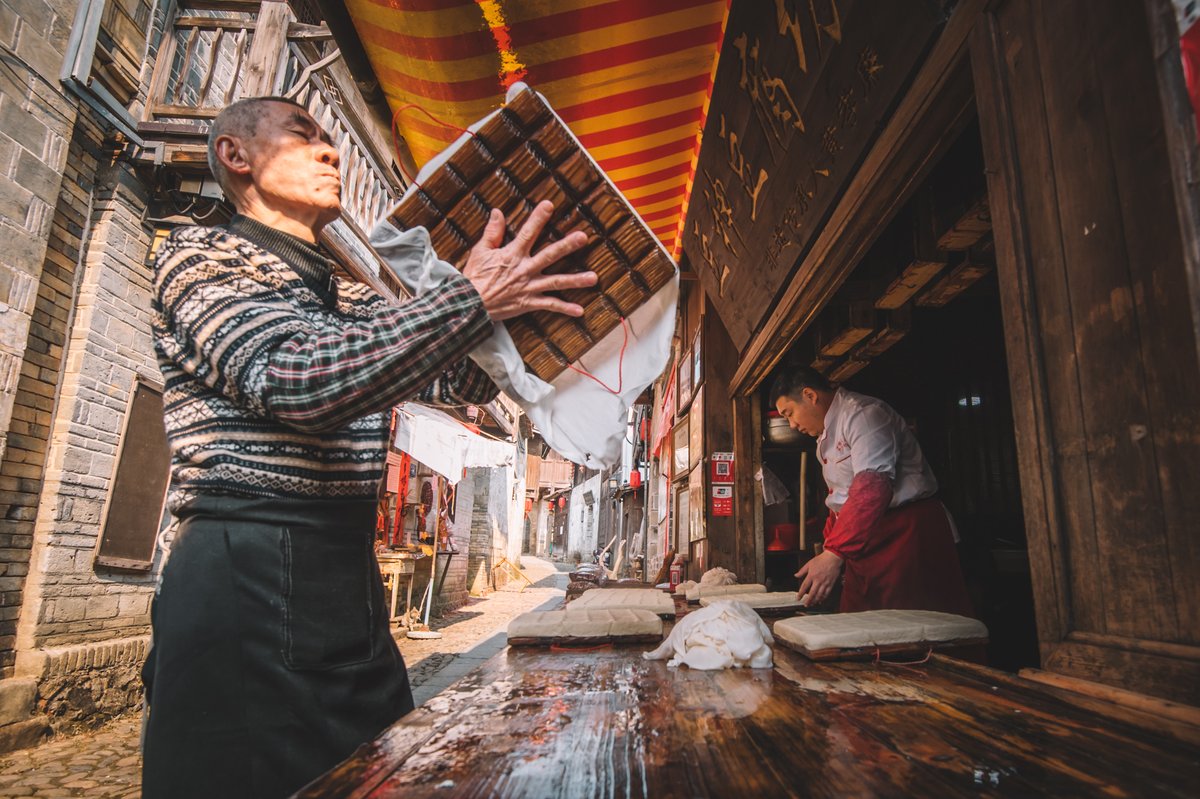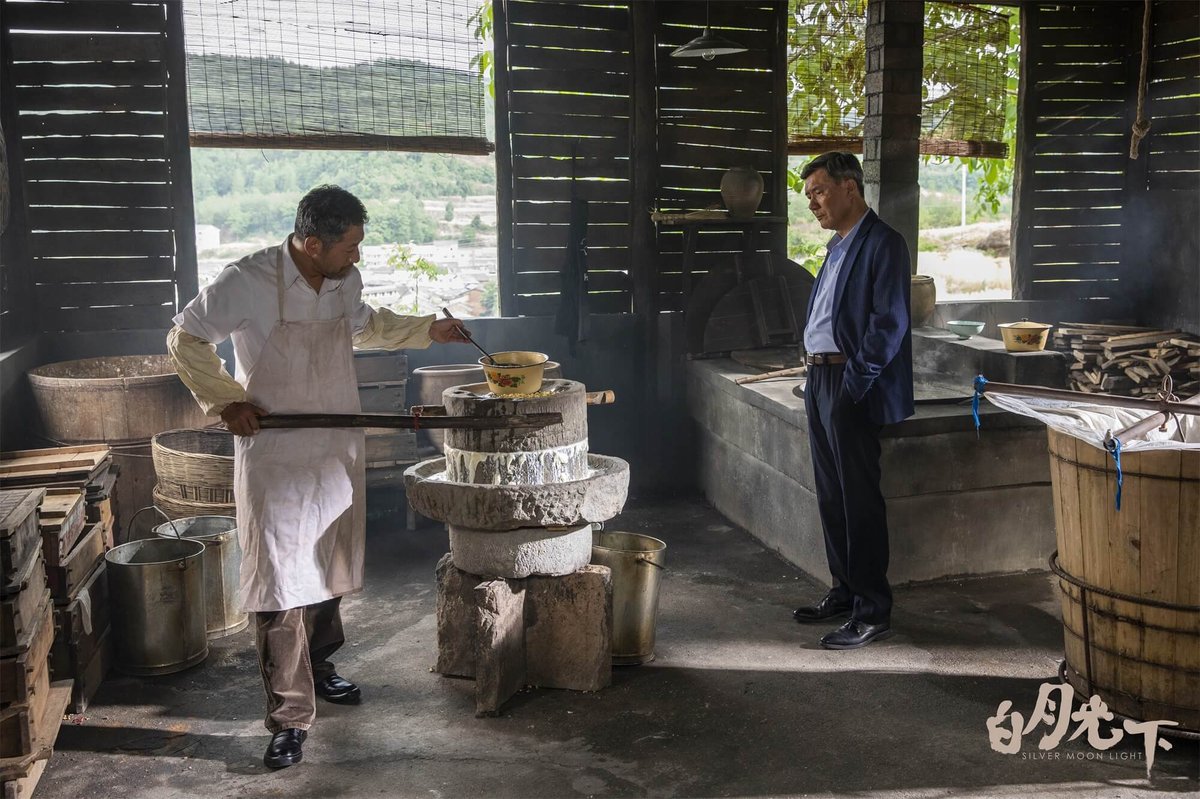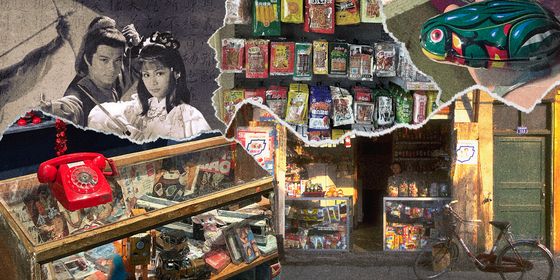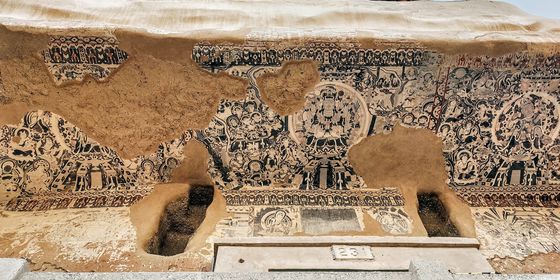With a childhood spent working day and night making tofu, a young man reflects on the changes his family and the society went through
Shenwei, the writer of ”My Mother Ran a Street Stall for 13 Years, Eking Out a Living on the Margins,” tells another side of the story of his family’s small business.
***
Online shopping did not truly begin to spread across my hometown of Jicheng, Gansu province, until around when I finished middle school. Trends always take longer to reach our small county town in the depths of China’s Northwest. Online retail platforms—think Taobao and JD.com—only became popular here after 2015.
In Jicheng, agriculture is a small-scale affair, while industrial production has almost entirely vanished. The town relies on a lively network of family-run stalls and workshops. Run at a relatively low cost from residents’ own homes with every family member enlisted, these workshops represent a ticket out of financial vulnerability for many households in the county.
This was the true, hidden force of our local industry. In Jicheng, a myriad of family-run shops specialized in all sorts of retail—mustard and flaxseed oils, halal foodstuffs such as baiji mo (白吉馍, a kind of round wheat bread baked over a fire), hand-pulled noodles, soy and mung bean products, and even sewed items such as hemp shoes. Customers favored the mountain goods market or the street markets on Xiguan and Dongguan St over supermarkets, and sometimes they would even drop by the vendors’ homes. Of course, these primitive, simple businesses show up nowhere in the official GDP, but they’ve sustained local economies in China’s small towns for thousands of years.
Where are the roots of China’s industrial civilization? Perhaps, they’re right there in the family shops in the meandering back alleys. Among them is my Dad’s tofu business.
1/7
Dad didn’t have any know-how when he started making tofu. He had been a long-distance driver until an accident landed him in serious debt. He needed a new occupation, which is how some acquaintances got him in touch with a guy making tofu in town. Mom recalls that the man hailed from Sichuan, where his kids lived and had reached school age. Otherwise, why pack it in and pass his knowledge onto someone else?
The tofu guy started by showing my father the ropes, without actually talking him through it. Much like most artisans, he was not keen to show all his cards at once. Whenever he did offer feedback in his thick Sichuan accent, my dad was usually none the wiser. In any case, Dad got the message after a while. Because he’d paid tuition and now there was no way out, he got over his initial embarrassment, gritted his teeth, and bought two packs of fine cigarettes. For each question he raised to his master, he offered tobacco and tea, one smoke and cup at a time, but even these pleasantries earned him a little over half of the guy’s savoir faire.
You could hardly say that my dad nailed it at the beginning. His tofu brine was past its prime, or he’d mixed in a little too much calcium sulfate a, a widely used tofu coagulant. He had yet to grasp the right amount of water to use, so the resulting slurry was either too thin or too thick. Both to the eyes and to the palate, Dad’s tofu was a disappointment. “What a waste of soybeans,” my mother would declare before making us all eat our fill of faulty tofu for breakfast, lunch, and dinner. Boy, did that make me hate tofu.
With the pressure to make money, though, Dad could only afford so many rounds of trial and error. He poured himself into the trade, and soon enough, his master was finally approving of his craft. My sister and I sure were thrilled to see tofu off the family table.
***
In 2006, already marching to the beat of his own drum, Dad dug up a small vegetable garden on the west side of our old courtyard house, where he built a small factory out of mud and bricks, dragging inside a soy milk maker before welding a steamer all by himself. The rest consisted of inexpensive tools—bamboo partitions, gauze fabric, wooden racks, hoisting jacks, and so on.
A day of work in summer began by 3 am, when the alarm clock woke Dad up to soak the soybeans. On warm days, it didn’t take long to hydrate the beans, but over-soaking the beans would make it hard to extract the slurry later. On winter days, he could put the beans in water before bed, but had to wake up at 5 or 6 am to deal with them. The freezing cold could bite one’s ears off.
In the Northwest, all year long, early morning soybean grinding is also quite a grind on the tofu maker. It requires fast hands and wits, with one person doing the job of three. The soy milk maker burns if you leave it to churn without beans. Often, the machine is running out of soaked beans, but as soon as you add more, it’ll be time to empty out the full soy milk bucket. After three buckets of soy milk, the grinding disc will be overflowing with bean dregs to be cleaned, but the boiler is bubbling with a hundred kilograms of cooked soy milk ready to be switched out, otherwise it’s just wasting fuel. No distractions are allowed when you’re doing this precisely interlinked series of tasks.
I really believe this saying that goes “there are three kinds of suffering in this world—poling a boat, forging iron, and making tofu.” I helped Dad with odd tasks at his tofu workroom since I was nine. But I was so clumsy that he always scolded me. My older sister was cut from a different cloth. She’d been at the shop even earlier than me, mastering the whole thing by the time she was in sixth grade. What’s more, she grasped how to start the soy milk maker by just watching a few times, no need for Dad to teach her. If anything, she was better at the job than the grown-ups.
But boiling the soy milk was at best just prep work. Dad was in charge of the next, rather technical step—“curdling.” In our hometown, this was traditionally done with a brine solution, yielding a firm tofu (老豆腐, lǎo dòufu). However, the guy from Sichuan taught my dad a second method where you used calcium sulphate. This would land you with soft tofu (水豆腐, shuǐ dòufu), also known as southern tofu. The curdling stage is an entirely different beast, with the to making the soft tofu being particularly complex and detailed, I found it the most annoying of the two to make, and I grumbled my way through the entire production.
In order to make soft tofu, you would first use a small bucket to scoop the cooked soy milk into a large glazed clay vat. Then, you would incorporate the calcium sulphate solution slowly, stirring back and forth. Experience had taught my dad to avoid throwing in the coagulant in its dry state, or the liquid could turn into uneven, small lumps, ruining a perfectly good batch of soy milk. A tender, silky block of tofu relied on the right ratio of calcium sulphate solution to soy milk. Too much coagulant and the tofu would come out bitter and astringent; too little and it would yield a shapeless blob. Dad had a good grasp on the subtleties of the process—he eyeballed an appropriate amount of solution, and scooping a ladleful of soy milk in and out of the tank a few times was all it took for him to assess the mixture for its thickness and texture. During the curdling process, Dad always shushed me. Even with the loud buzz of the machines, he remained calm and detached.
As the coagulant took effect, the loose molecules of soy protein started coagulating one by one until the pot of bean curd was ready for us to press. Soft tofu is easier to press than firm tofu. Dad placed two special bamboo partitions on the bottom, then stacked a square wooden frame on top. He pulled a square of porous gauze, or cheesecloth, evenly over the frame, leaving the four corners out. With an aluminum ladle, he then carefully scooped in the curd, the solid substance formed through curdling, until it covered the bottom. Then, he layered scoops of bean curd into the mold, filling it from the corners into the center.
In the end, he grabbed all four corners of the gauze with one hand, all while tying a neat knot around them with the other. The wrapping must be tight, otherwise the shape will fall apart as soon as it comes under any weight. Then, Dad would cover the mold with a wooden lid, placing two large buckets weighing some 30 jin, or 15 kilograms, of water on top in order to press the whole setup. From here on, it was all a matter of time.
Firm tofu followed a similar method, sans the wooden frame at the pressing step per local customs in Jicheng. Wrapping firm tofu is a true handicraft; only sometimes would Dad step aside as the technical director to let us kids try our hand at it. Here, even my otherwise dexterous sister had a hard time wrapping the curd.
Wrapping firm tofu starts with placing a large woven bamboo mat on the wooden board designed for draining the liquid, and lining the mat with a square of a stronger gauze. My sister and I would stand on either side and evenly lift the four corners of the fabric. Dad poured some curd directly onto the center of the cloth before smearing it finely with his aluminum ladle to avoid air bubbles or cracks. He would then immediately add a new layer of curd. Time was of the essence here—if the curd cooled down before the vapor got out, it would seal in the sourness of the brine and ruin the flavor.
With Dad’s last ladleful, we stepped in for the wrapping—neither too loose nor too tight. This was not a simple skill you could learn overnight. After the tofu was wrapped, the wooden board and heavy water buckets went on top. Once again, this step required delicate care. A single bucket wouldn’t have been enough to press the liquid out, but if you pressed it too much, you’d end up with bean dregs.
The whole setup of firm tofu and heavy water buckets was like this upside down pyramid in a void—balance was crucial here. Such is the way of life: slow and steady wins the race. In my youth, when I got tired from work, I would occasionally stare blankly at this wonderfully balanced tofu-making contraption. Once I started studying physics in middle school, I even drew a force analysis diagram in my mind for the entire thing. Now, I got it: making firm tofu works a bit like life. Our existence is like that large, pressing bucket, silently placed over our bodies for a long, drawn out period of time—just like the curd, we are slowly squeezed dry and pressed into tofu.
2/7
Tofu, after all, sells for a few mao (10 mao makes one yuan) more than the curd. Our family shop stood out among our competitors because we also offered a larger menu of homemade soy byproducts, such as tofu sheets, tofu rolls, dried tofu, spiced tofu, and tofu puffs. Often, they sold for more than plain tofu itself. A jin of soft tofu cost 1.6 yuan, while that much dried tofu may sell for 2.5 yuan.
Prior to 2008, my family always made tofu sheets, tightly pressed thin layers of tofu, with the most traditional handcraft method. It was extremely time-consuming and labor-intensive, but the process fascinated me enough to hang around Dad whenever he made them. Dad took a small bamboo partition about half a meter long, 20 centimeters wide as a base, stacked with a set of rectangular wooden frames. Above it, he hung a large roll of long, thick gauze, pulling one end over to place it on the wooden frame. Then, Dad would scoop the curd with an iron ladle with one hand, while taking a T-shaped bamboo tool with the other to ensure an even spread. For a man of his short stature, doing this was no easy feat. With swollen veins and a hunched back, he spread and smeared, as if painting with sand. For each thin layer of curd, he covered it with a fresh section of the gauze. Fold, spread, wrap, repeat.
Dad’s grumpiness only softened when making tofu sheets, so I liked watching by his side. The long hours spent bending over often made his back rage with so much pain that he couldn’t stand up straight. Whenever the pain hit, he asked me to go grab him a pain relief patch. The lingering smell of the medicine became a staple scent of the tofu workshop in addition to the usual fragrance of soybeans.
I felt wrapped up by the sweltering, steamy atmosphere where I sweated profusely, where the ground was flooded with bean water, the machines roared, and Dad yelled his instructions over them. Here in the steam, I formed a team with my father and my sister, but my inclination to chatter often delayed the tasks at hand. “The pipe ran out of gas,” or “It’s time to load up the boiler with coal!” or “Oi! The soy milk bucket is about to overflow. Shut up and get down to work, now!” I was the clingy, annoying brat that my nimble, straightforward sister picked on and bossed around. Making tofu isn’t a whole lot of fun to begin with, and cramped together in that 80 square meter workroom where repetition repeated itself from 7 am, we were better off if we at least let out our agony. As my dad’s temper got even shorter, we were bound to butt heads.
My older sister was stubborn. She dealt with any disagreement by throwing up her hands and locking herself in a small room to sulk. Not even Dad’s howling would get her to budge, so miserable old me became Dad’s perfect punching bag, even if I didn’t stop working. This made us snap at each other for the smallest reasons. I wanted to mimic my sister’s ferociousness, but I was a true softy at heart, which my father knows all too well. My weak spirit stood no chance against Dad’s fits, and he always had me back into the workroom with just a few remarks.
Then it was time to peel the tofu sheets. I was too young for heavy work, and also too slow in general, so my sister often commanded me to the storage room in the northwest corner, where I was to peel the tofu sheets off the gauze. Yet another tedious task that required tons of patience. Peeling the hot tofu sheet is easy, but once it cooled down, it dried on the gauze. However, the moisture in the fresh sheets make them hard to peel without tears. The torn sheets are no good for sale, and have to be processed into tofu rolls or spiced tofu if you still want to make something out of them.
Tofu sheets are a particularly coveted soybean foodstuff, which greatly consoled me at first. I was no less than my sister, busy next door with her own tasks. However, soon enough I was once again disappointing Dad with my stupidity, and earning myself yet another round of scolding and beating when he saw the torn sheets during his inspections. I was fed up with the tofu shop, fed up with working, and fed up with the contempt in my father’s eyes.
***
Selling just tofu does not make for a fat purse. We had to expand our stock, both in terms of variety and quantity, in order to make a bigger margin. My mother’s small pedicab couldn’t possibly conquer new markets, so my family bought a new tricycle. Now, Mom consistently set up shop on the street, while Dad manned the tofu-making in the morning and, in the afternoons during the holidays, took me patrolling nearby villages to find additional business.
Jicheng may not be big, but we’re still talking about a population of five to six hundred thousand people. That’s a lot of bellies to fill. My mother set up shop at Xiguan Road, while my father realized there was a dearth of businesses specialized in soy products in nearby villages and towns. A good horse is equipped with a good saddle, they say, and if you want to make real money, upgrading your production tools is a must. Dad took it upon himself to soup up his three-wheeled cart. Any upgrade was geared toward extra money. He raised the height of the vehicle by welding iron frames around the carriage, hooped it with linoleum cloth, and placed a plastic signboard on the side to display the list of goods for sale and contact numbers.
My father took me with him on the remodeled tricycle from Shagoudi, at the east end of the county, to Zhuqueyu, a town in the deep mountains at the west end of the county. We went back and forth, with much yelling and honking. Shagoudi is a hub for mining factories operating on the private sand mines on the side of the national highway. Though remote, there is a large concentration of workers there, and all factories have their own canteen. It really was a well-situated place for business, just like Zhuqueyu, a relatively large town in Jicheng away from the downtown area but close to the railway track, where it boasted a bustling marketplace.
Terrain-wise, Jicheng is like a bowl enclosed by high mountains. Dense pockets of population are scattered on the land between the hills. However, those nooks were out of our reach, with our tricycle’s insufficient horsepower. We could only visit the local villages and towns around the county town. Catching the big market meant that we needed to work overnight to avoid running out of stock. We went to sleep late and woke up awfully early to stock up and load the tricycle. I was always so groggy that Dad had to sweep my lazy bones out of bed with a broom.
3/7
Fried food is the star of the show in Jicheng during Chinese New Year. Midwinter is marked by a series of rituals where every household makes offerings to their ancestors with fried meatballs and dried tofu sheets. So big winter markets presented good opportunities to make our pile, as long as we were willing to shiver in the merciless Northwest winters. Step out of bed and you’ll be greeted by a temperature of 10 or 20 degrees below freezing. The cold wind drilled into our ears with the sharpness and precision of a cat’s tongue. Inch by inch, our ears, lips, and fingers turned into a chapped mess.
Loading up soybean products on the cart was a royal pain. We constantly racked our brains to pack every inch of space and save time by making fewer trips. However, sometimes we still ran out of stock. In remote towns far from the county seat, people dealt with the hassle of groceries by shopping in bulk at the big markets—several sacks of goods in one go. Our full cart of cargo was easily gone.
Going out of the yard, we were faced with a downhill slope that met the neighbor’s one-meter-long wall. It was a sharp turn to take in an all-too-narrow alleyway. Every time we loaded up the vehicle, I was riddled with anxiety at the thought of the wheels slipping when Dad turned the cart at the end of the slope. As we set out, both of us squeezed into the front of the cart, and helped Mom set up her stall before hitting the road to the markets with our own load.
On the way to market, I could count on Dad’s cunning bribe for his gluttonous, indulgent son—a feast of steamed buns (my favorite) filled with pork or leek, or fried pancakes. This was my motivation to embark on the journey. It was also yet another reason why I would never be like my sister. She never fell for such tricks.
Dad loved his food even more than I did, and here too he was different from Mom. My mother is a conscientious, thrifty housewife, always bringing home-cooked meals to her stall duty. She was never willing to indulge her palate with our hard-earned money. Women are more respectable than men, I honestly feel. We men often regard our family merely as a starting point and source of support. Women hold their family as their ultimate goal and destination. The weight of the household rests on their shoulders.
***
After satisfying ourselves, Dad and I hurried the three-wheeled cart on a long, bumpy westward road to the large marketplace at Zhuqueyu Town. The exposed railroad tracks were like snakes stretching endlessly on the ground, bathed in the dazzling sun. I sat next to my father, eyes sore from the reflected sunlight, thinking of trains faraway speeding toward terra incognita without ever stopping.
At the market, a crowd was already surging. Children on winter break squatted in pops of colorful outfits, playing with spinning tops. Their screams rivaled the sporadic sound of firecrackers echoing in the village roads and countryside. The street was lined with rows of stalls, and vendors everywhere chatted and peddled their wares from their small stools. The houses behind them flaunted decorative tiles with flowers, birds, and auspicious sayings—“Heaven rewards hard work,” “Tranquility is happiness,” or “Good fortune fills the garden.” A throng of locals gathered around a stall penning Spring Festival couplets by the red brick wall of a courtyard, eager to harvest their own piece of spring happiness.
Dad and I rushed to occupy an open space and set up our booth without skipping a beat. However, business was still sparse over an hour later. It was time to whip out the small speaker for a little broadcast. “I got it all and I got it cheap! Rice cakes, tofu sheets, hotpot meatballs, tofu rolls, deep fried meatballs! Wholesale and retail all welcome!”
No noise, no business. The speaker never failed to lure customers in, the first few out of sheer curiosity and then followed by the ever-growing crowd.
This was my time to shine. After all, you gotta talk your way into the customers’ heart, and what a lovely surprise to get an earful of the goods on sale from a tiny vendor. I sure was a sweet young thing, addressing everyone as “Auntie” and “Uncle.” “One yuan for three slices of rice cake, and I’ll give you an extra one if you spend 3 yuan.” “Tofu is 5 yuan and 4 mao, but let’s just round it down to 5 yuan, okay?” “Auntie, go for Qiuxia brand for hotpot ingredients; it’s so yummy and cheap! Way more affordable than the Hongjiujiu products...”
Sometimes, though, Dad wasn’t all that impressed with my strategy of shaving prices off to the round figure. He’d bicker with the customer for those extra mao, but then I, too, became stubborn. I felt he was looking down on me as just a little kid, and I sided with the customer to teach Dad a lesson. We would be flushed with anger, faces red, neither willing to give an inch. Ironically, this only stirred the curiosity of our customers; now we were talking good business.
The ruse from my elementary school days—“emotion-based marketing”—is now a popular trick across online retail platforms. Vendors in livestreaming sales stage whole sketches of the salesperson seemingly turning against the brand’s interest in favor of the customers. Well, this strategy is a tale as old as time at rural marketplaces. “Magic superglue! Strong enough to stick a whole aircraft carrier together!” “Are these cleavers pricey? Why, the boss is my cousin.” Been there, done that over a decade ago, as a little salesman next to the family’s tricycle working his tail off.
If you think there’s anything new under the sun, think again. It’s all the same old, well-trodden story.
***
Business grew more challenging in the summer. Back then, proper refrigerators were rare for most households in northwest China. Soy products rotted so fast, they weren’t easy to store in summer. Hardly anyone bought for more than one or two meals at a time.
No wonder Dad was particularly grumpy in the summer. Even with a refrigerator at home, we lost part of our soybean products to smelly mold. Business was tough even with those goods we managed to bring out the door. In winter, we soaked two 70-jin sacks of soybeans at a time; just half a bagful did the job in the summer. Seitan and cold noodles known as liangpi were popular snacks amid the summer heat for workers in Shagoudi and Dongtou County, so our family added them to our offerings to supplement our meager profits.
In the summer, Dad still drove the tricycle as usual. This time my place was in the carriage, surrounded by plastic baskets full of goods. On the uneven, rickety road to our destination, I killed time reading the comics I’d borrowed from the bookstore. On arrival at Shagoudi, I hopped off the cart and we peddled along the winding path.
Even then, business still relied on whatever money the workers had to spare—and our punctuality. To sell these snacks, we had to be ready for action well before mealtimes, or else on Saturdays, when the workers’ canteens closed. Once, I threw our schedule off by hiding in my room to read comics. By the time we finally arrived, workers had already gone to the canteen that had just opened.
That day, Dad and I came back with half a basket of unsold goods. Even though Dad didn’t stop grilling me on the way home, I was still lucky that he didn’t find out about the comics. Dad only assigned the status of “serious reading material” to school textbooks, and hated to see me wasting time with any other book. We played a regular game of cat and mouse where I took great pains to choose a different hideout for my comics each time. Even so, I often got busted.
4/7
I may have dreaded sales duty, but what I truly despised were the days spent at the tofu workroom. Neither spring nor autumn ever penetrated those walls where you could only freeze or suffocate in the heat.
Summer may have been our off season, but we didn’t get any days off. There’s nary a gust of wind in the hot and dry summers in Jicheng, and yet you could find us at the workroom alongside boilers full of raw soy milk. This was a tough job. Whenever I’d open the lid to load up the boiler with crushed coal, fiery sparks gushed out immediately, and the heat wave menaced to swallow me up. Beads of sweat—the size of soybeans—poured out from my forehead. Sweat had pooled and dried on my half-sleeve blue top, leaving behind a pattern of white, salty traces.
The tofu workroom is like a sauna, and perhaps I owed my fair complexion to all the time I’d spent there since my early childhood. My skin never gleamed with the ruddy color that was the standard for locals. My mom lamented that I looked like a little girl, though really, I went against the family’s grain in just about every way.
Whenever I slacked off, I would squat on the steps in the yard to look at the tofu workroom, still wearing my apron and slippers. The steam rose like smoke puffing out of the windows, doors, and vents. The white mist that surrounded the brownish red walls made the factory look like the alchemy furnace of Taishang Laojun, a Taoist deity. As the water vapor diffused and muted, a sense of immortality filled the yard. The whole spectacle was a fascinating reminiscence of a scene in the 1986 rendition of Journey to the West, showing a large blanket of clouds spreading over Lingxiao Temple during a peach banquet in heaven.
Dad was not a fan of my imaginative spells. He never ran out of steam to shout at me.
I feared winter the most. Our family was poor, so I only wore my good pair of shoes to school. At work, my sister and I had to tire ourselves wading in bean water with hand-me-down work boots from the grown-ups. Dad’s old mud shoes still reeked of his foot odor. In the summer I could at least get away with wearing slippers, but winter left me no choice.
In winter, the sweltering steam in the tofu workroom kept our clothes drenched in sweat, the inside of our rubber shoes was always wet and cold. Stepping in them was a pain. Whenever we pushed open the heavy door curtain, piercing cold air blew across our faces, reminding us of the sharp contrast between our furnace of a workroom and the icy outdoors.
Mom had her own reasons to dread winter. Arthritis comes with prolonged exposure to heavy humidity. She couldn’t prevent her seasonal ailments—chilblains, chapped skin, and scabs accosted her all winter long.
***
Mr. Jiang, the tutor in charge of our fourth grade class, once paid us a surprise visit on a Wednesday evening. Dad answered the phone just as we were busy at work. The machines were grinding the soybeans, and my sister was brushing the slices of firm dried tofu with burnt syrup for the color. Dad put down the phone and asked me to go meet Mr. Jiang at the entrance of the alley.
A total of three families lived in our alley, a street that branched out onto a main road within walking distance of the party school. I stood at this intersection and after a while Mr. Jiang showed up, pushing a black bicycle. He was shocked to see me in my apron and clunky mud shoes. And when he arrived at my door, he asked, “How come there are factories around?”
Rather than answering Mr. Jiang’s question, I lowered my head and invited him into our house, where he was obviously just as dumbfounded to find the busy production scene. Dad kept working as he instructed me to boil water and make tea. Mom had closed her stall early and rushed home upon hearing about Mr. Jiang’s visit.
I can’t say I remember anything my teacher said during his visit, other than his immediate shock when he first walked through our door. “Now I understand why you doze off in class every day,” he said.
Mr. Jiang was fairly young himself. He’d just graduated from normal school and he was stricter to me than any other pupils. He was keen on hitting the students’ palms with bamboo boards, and I was his daily target. However, from that moment on I never held a grudge against him. The story of our family business soon became well-known at school. But unless it came from a female classmate, I was also usually impervious to teasing.
5/7
Our family shared the general impression that 2008 was a meaningful year for Chinese people. We closed that year purchasing three new machines with years of savings, and their arrival officially marked the prelude to the “golden decade” of our family’s tofu business.
At first, Mom was not on board with Dad’s purchase plans. Our family was still in debt, and there was no definite end in sight. This, plus the tepid business at the stall, weighed heavily on my mother’s heart. We couldn’t even sell out of the handmade goods we already had, while the new machines would generate even more stock. We were here to sell everything for a profit, she reasoned, rather than squandering our funds to produce more.
Dad couldn’t disagree more. Though short in stature, he was willing to take risks in life. He’d made up his mind to buy those machines, period. In hindsight, I can understand his point. His was the courage that will seize any man trying to escape the crushing weight of poverty. Dad had already suffered enough hardship, and he was ready for a change. Just how much money were we ever going to make from tofu?
With the quiet yet relentless beat of the changing times, Dad had finally realized that he had to ramp up our productivity if we truly wanted to make money. One night he told Mom, “We have to be like the Monkey King; he knew how to find a weapon that served him right. We need to invest in our future. We must buy those machines!”
To a certain extent, Dad was a technology guy. From the get go, he had adopted techniques outside the usual norm among traditional tofu shops. While other families boiled soy milk in large iron pots, Dad borrowed money to buy a small, yet fairly expensive steam pressure boiler, but it boiled fast and therefore produced more with less time. “In the long run, this boiler will be incredibly useful for us.” At least that’s what he told Mom to appease her.
Now, this previous investment would truly shine alongside a new trio of high-performance, yield-boosting artifacts—a bean dregs mixer, as well as a tofu sheet machine and peeling station. They were promptly shipped home, and the roar of the machinery seemed to herald the entrance of our tofu shop into a brand new, semi-automated era.
There was plenty to figure out and adjust as the new machines joined production. Dad designed and welded a three-sided “throw-in basket” to the bean curd machine, so the sheets didn’t pile up in a way that made them lose their shape. His inventiveness finally freed us kids from many tasks, and even Mom sang Dad’s praises. “The dung beetle is good at rolling its ball, it seems.”
The days of Dad bending over to paint the tofu sheets and me fretting over the task of peeling them were finally over.
***
To fill in the gaps of our summer business, Dad also bought a rice cake machine, even setting aside an area in the tofu workroom for it. Other than retail orders, rice cakes were frequently bought in bulk by barbecue stalls. Summer break saw college students returning home, followed by pepper picking season and temple fairs—all occasions for barbecue and fried foods stalls. Rice cake business was immediately booming.
In winter, Dad had to shoulder even more burden, having to fulfill the demand for both tofu and rice cakes. Our family had hired a long-term employee before, but peak winter season required that we hire a second, short-term worker. The grind truly never stopped as we approached Chinese New Year. Neither the machines nor the people operating them ever got a break.
The holiday season meant double wages for workers. Dad wanted to earn more money, so he held on to his old trusted model of small profits with fast turnover. However, the huge daily workload and his infamously hot temper translated into hell for us kids. Running on the tight schedule of tofu making, everyone was all tensed up. No one could put up with this for long without lashing out.
As we entered the 12th lunar month, things only grew more complicated. For all the goods that came out of the workshop, we also needed to pull in quite a lot of supplies. Soybeans, glutinous rice, coal, you name it. To fit them in our small space, we had to bring in small quantities at a time with repeated orders. Not many stores were willing to deliver, so my sister and I had to break our backs for the family again.
In a typical 12th lunar month, we handled around 300 jin of soybeans and nearly 400 jin of glutinous rice each day. Though this was really way too much for a family workshop, Mom beamed with pride. “Every profession can produce its own expert. Look at how many people eat our tofu and rice cakes during Spring Festival. How could others enjoy a good holiday without our efforts? Now that’s our contribution to society.”
Mom’s words made me question the saying that “the earth still turns without anyone” for the first time ever. Life would truly be so much more insipid and inconvenient without small shops like ours, run by laborers at the bottom of society, such as my mother. For the working class my folks were a part of, the flavor of life comes from fighting the drudgery of the everyday.
Dad also fixed up our tiny workshop with a “leave no trace” mandate. Tofu production often floods the ground with bean water, which turns rancid if you fail to clean up frequently. As a naughty kid, whenever the task fell on me, I would just fool around with the broom a couple of times before calling it quits. Come inspection time, there were always small ponds glistening under the electric lamps. Now I was meeting the broom again, but with Dad brandishing it against me. This is how I developed a conditioned reflex to turn off the lights when I left.
***
Back then, each year felt painstakingly long. All too often I found myself hoping that I’d grow up soon, to finally part ways with the noisy tofu shop. But, my folks were always eager to add more to their already heaping plate. As a kid, I once said foolishly that I hoped we’d have fewer customers so that I could rest more. My mom and other grown-ups cracked up, looking at me as though I had a few screws loose. As if there was such a thing as making too much money! It never occurred to me that the thriving business was thanks to Mom’s painstaking efforts. To me, making money didn’t seem like a difficult feat, and I often went on strikes with my sister.
This went on until one rainy day, when I saw from our small stall a row of old folks standing across the street, carrying bamboo baskets of their homegrown vegetables for sale. They were stuck in a difficult position where they feared the rain would spoil their produce, but seeking cover might mean a missed business opportunity. But, the streets were empty already. Who on earth was going to buy their produce?
“Just how much money are you going to make out of a basket of vegetables? Their price drops on a rainy day; farmers don’t have it easy trying to earn a living.” Mom may not be an educated woman, but her words of wisdom stayed with me.
“We make our money, even if we’re always busy and tired. As long as we’re willing to work for it, we may enjoy a nice enough life. You see, it’s just like your studies. There really isn’t anything too difficult in the world, if only you’re willing to endure some hardship. “So many steps from a soybean to tofu and tofu sheets, right? Same goes with people. You must endure great pain for a decent life.” Mom said, “If you don’t want to be like me, stuck here making tofu for the rest of my days, you better study hard.”
But, I felt like a stunted soybean that could never soak up enough water, pitiably clumsy.
6/7
We had a rapid turnover at the tofu shop; several of our full-time workers complained and quit after barely two or three days. They were hardly to blame. Those working for factories at least got some holidays, but there was no such thing as time off in our workroom. If anything, in peak times, these ladies often had to return home late. The way things were in Jicheng, our family could not possibly afford to hire male workers, and not just due to their usually higher wages. These men usually liked their tobacco and booze. A small family business like ours just couldn’t deal with any of that.
So, my sister and I had to roast over at the tofu workroom. No wonder I was known for slacking. How could you possibly expect a 10-year-old kid to work like a grown man?
My sister and I often quarreled with Dad. With his machismo, his educational methods boiled down to whatever stick he could find to discipline us with. We often fled from his constant, unfiltered scolding to go to Mom’s stall or simply slip out of the house to play. Sadly, no breakout went without punishment. At school, I always did excel in political sciences, perhaps because Dad and I made a perfect recreation of class struggles between capitalists and the proletariat. I could really relate, in a straightforward, personal way, to Marx’s critique on the primitive accumulation of capital and the accompanying exploitation.
Eventually, we hired a stable long-term worker who came to us through an acquaintance. Auntie A La was a tall, capable Tibetan woman who worked fast and had a son four years my junior. She was especially kind to me, always making a case for me against Dad’s roughness.
With Auntie A La, whom neither of us kids truly ever saw as hired help, business at the tofu shop became much easier to handle. She ate with us, and sometimes even took care of the cooking. Her crispy pork dough drop soup (酥肉疙瘩汤, sūròu gēdatāng) was my favorite. Apparently, this was a local specialty in her hometown. The cleaned pork belly was cut into small slices, stir-fried in the pan until crispy, and then mixed into a bone broth soup after stir-frying some more with diced potatoes and sliced carrots; once the soup boiled, she would use a pair of chopsticks to add drops of a batter made with buckwheat and wheat flour, which formed small lumps as they boiled with chopped green veggies. Finally, a few handfuls of bright green garlic shoots and coriander topped a bowl that warmed our stomachs for a whole winter.
Freshly made tofu does also smell great, and even though my sister and I were sick of it, some other soybean products we did like. I never said no to oily tofu skin.
Oily tofu skin is basically the condensed layer that forms on the surface of cooked soy milk as it cools down. A large pot of soy milk yields up to three sheets of oily tofu skin, and the consistency of the soy milk is crucial for the coagulation of the skin. If you add too much water when grinding the beans, the skin does not coagulate. The skin is a telling sign of a good pot of tofu.
My sister and I never quite enjoyed the thickness and beany smell of soy milk, but Auntie A La loved it. Maybe that was the secret to her shiny, thick black hair. Mom scolded me for my pickiness. “Like casting pearls before swine!” And, honestly, she did have a point.
Nowadays I love soy milk, though the stuff you usually buy from stalls is too thinned out and has no bean flavor. Since we shut down our family tofu workshop, the thick soy milk of my childhood is no longer available to me. How ironic that I now long for what I once scorned as a kid. But, that’s how it was with the era of manual production. People often complained about the low yield and high costs, only to yearn for everything that was lost when machines replaced human labor with the arrival of the industrial age.
***
I must have been transitioning to middle school by the time my family finally paid off most of our debts with the savings from our workshop and stall. Mom had wanted to renovate our dilapidated property, but once again Dad gritted his teeth as he exposed his grander plans. “Might as well rebuild altogether.”
As I said earlier, our home had originally been a small courtyard house, and the small vegetable garden replaced by the tofu workroom was my “secret base.” I sat by the threshold wailing when Dad grabbed a large saw and did away with the grape vine grown in the garden.
Dad wasn’t supportive of Mom’s plan for a “small two-story,” either. “How about another floor?” According to local customs in Jicheng, the more storied the house, the more prosperous the family. Both my parents are countryside folk, with Dad’s hometown particularly remote, an hour away by car. The two had worked hard in the county seat throughout the years, so their fellow villagers were all watching how they fared.
Mom realized that Dad wanted to show off. This is how things work in poor regions—people respect your fine silk garments before they extend that same courtesy to you. Thus, she gave it some thought before finally saying, “Why, let’s build a four-story building, and the top floor can be the tofu workroom.”
This time, Dad was the stunned, silent one of the pair.
However, Mom was a woman of energetic action. She borrowed money from here and there to make it happen. From that moment on, we took on three fronts all at once: the tofu workshop, the small stall, and the construction site of the house. Dad recruited us once again to cut down on costs, and we helped him carry bricks, stir sand, demolish the old house, salvage whole bricks from the ruins, and more.
Little by little, we built our new home, complete with the new tofu workroom on the fourth floor. Amid our hustling and bustling, plenty of people from our folks’ villages came over to buy goods. Before, they’d always mocked my father. Now, they all exclaimed upon hearing about the four floors in our new house.
Building his own house in town made my father burst with pride. These were some of the happiest days for our family; it was rare for Dad to be this relaxed. He spent his days squatting here and there working at whatever home repairs needed doing, only stopping to look at the new house from every angle. Nothing could hide the joy in his eyes. He stood there, a middle-aged man filled with pride and a sense of fulfillment.
7/7
In 2019, after my mother’s small stall was shut down by the authorities, we sold our family’s tofu business and the machinery that had helped us carry out our “golden decade.” I was serving in the army when my sister called to deliver the news, when just the previous winter I’d still been working at the tofu shop.
A full story of struggle, spanning over 13 years from 2006 to 2019. Now, our family’s tofu shop was biting the dust, while plenty of other family-run workshops were gradually dying out in Jicheng. The changes that our small household underwent were mere spray in the wave of development that had reached our small town.
We had lifted ourselves out of poverty with our tofu shop. Though we were not rich by any means, our craft had granted us a decent, comfortable life. My mother had always thought her clumsy son would take over the tofu shop. Now, our business as we’d always known it had run its course.
With all the busy work at the tofu workshop, my sister and I never did our homework properly during the summer and winter breaks. A week before school was scheduled to resume, we just copied everything in a frenzy. Same went for the homework during the school year. This situation went on until my sophomore year in high school. My sister has always been smart, and her grades were as good as ever. But I found myself at the bottom of my class. My childhood and teenage years were populated by the realities of the family’s trade. Now that we were bidding it farewell, I felt as though everything had been a dream and I had lived twice.
My feelings toward our tofu shop had always been complex, mixed up with the exhaustion of my childhood years of labor and my complaints about Dad and his ways. Occasionally, I got flashbacks of my past life, grinding the soybeans in the dead of a winter night deep in the Northwest, running the boilers, or making tofu sheets. My sister and I, gluttons as we were, would bury potatoes and sweet potatoes in the ashes to cook them, sharing our delicious treat during a precious break. Once, I even buried two eggs, hoping to bake them in the ashes for a fragrant scent. Sadly, we got so busy that by the time I remembered them, they’d burned into coal.
Later, when I ate tofu from the supermarket for the first time, the taste just didn’t feel right. From time to time, I joked with my sister that I’d become a “tofu master”—I only needed one small bite to issue my verdict on the quality of the product.
However, the flavors ingrained in my memory will never come back. The tofu we made as a family tasted of our shared agitation and struggles. It was a flavor that anchored the memories of an entire era of family-run workshops in our county.
Then, the waves of time and change engulfed everything, and all that we’d gone through felt like a fleeting dream, flashing like a spark of electricity.





